现代英语词汇学概论chapter7
- 格式:ppt
- 大小:275.00 KB
- 文档页数:33
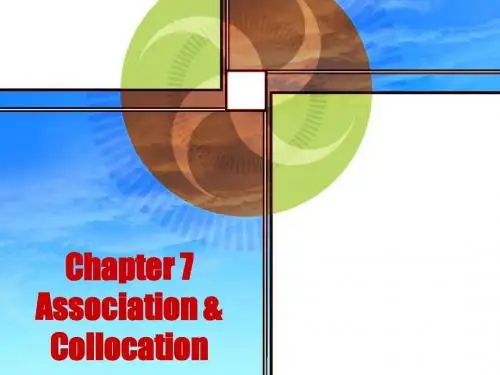
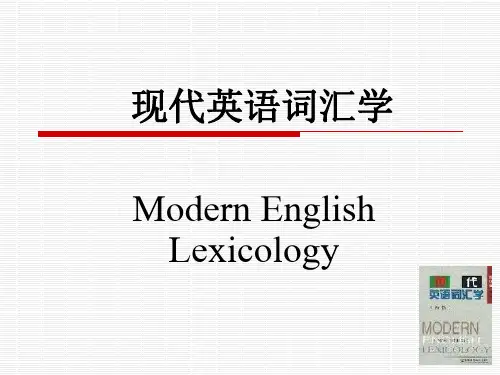
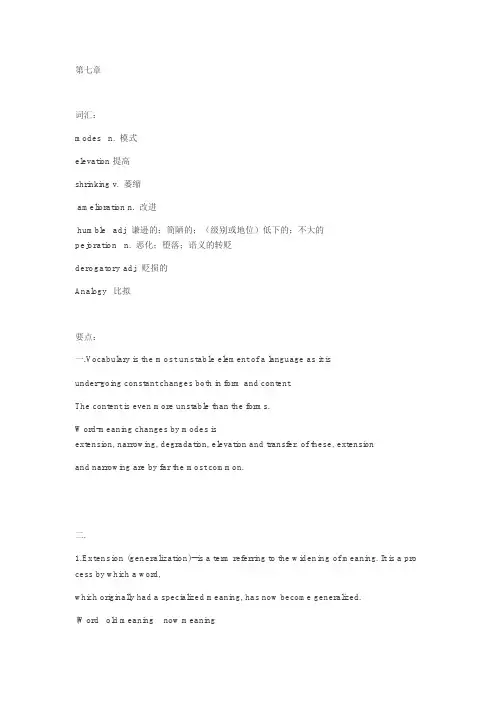
第七章词汇:modes n. 模式elevation 提高shrinking v. 萎缩amelioration n. 改进humble adj. 谦逊的;简陋的;(级别或地位)低下的;不大的pejoration n. 恶化;堕落;语义的转贬derogatory adj. 贬损的Analogy 比拟要点:一.Vocabulary is the most unstable element of a language as it isunder-going constant changes both in form and content.The content is even more unstable than the forms.Word-meaning changes by modes isextension, narrowing, degradation, elevation and transfer. of these, extensionand narrowing are by far the most common.二.1.Extension (generalization)--is a term referring to the widening of meaning. It is a pro cess by which a word,which originally had a specialized meaning, has now become generalized.(Word old meaning now meaningManuscript handwriting :any author‘s writing whether written by hand or typed with a type-writer or a word-processorFabulous resembling:a fable incredible, marvelousBarn :a place for storing only barley storeroomPicture painting include "drawings" and even "photographs".Mill place for grinding into flour place where things are ma deJournal daily paper periodicalButcher one who kills goats one who kills animalsCompanion one who shares bread a company·. A large proportion of polysemic words of modern English have their meanings extended sometimes in the course of development. Some words are generalized to such an extent that they can mean almost anything.Word old meaning now meaningThing a public assembly or a council anythingBusiness, concern, condition, matter, article, circumstance ·.Technical termsWord old meaning now meaningAlibi (a legal term) plea that the accused is not at the place excuseWhen the crime is committedAllergic (a medical term) too sensitive to medicine averse or disinclined toFeedback (computer term) response ·.From proper nounsWord old meaning now meaningLynch the Lynch‘s Law kill without lawful trialSandwish a gambler‘s name to denote a kind of fast place or squeeze betweenFood Vandal a member of an East Germanic tribe malicious destruction of a thingA person of such behaviourV. vandalize Adj. Vandalic/vandalistic n. vandalization/vandalism2. Narrowing (specialization) --is a term referring to the shrinking of meaning. It is a proc ess by which a word ofwide meaning acquires a narrower or specialized sense.Word old meaning now meaningDeer animal Corn grain maize Garage any safe place a place for storing carsLiquor liquid alcoholic drinkDisease discomfort illnessPoison drink poisonous drinkWife woman a married womanAccident event unfortunate eventGirl young person of either sex female young person.Turn into a proper nounsThe City business center of LondonThe Peninsula Iberian PeninsulaThe Prophet Mohammed.For economy, some phrases are shortened and only one element of the original is left t o retain the meaning ofthe whole.e.g. a private = a private solidera general = a general officeran editorial = an editorial article.Material nounsWord old meaning now meaningSilver silver dollarsGlass cup-like container or mirrorIron device for smoothing clothes3.Elevation or amelioration--refers to the process by which words rise from humble beg innings to positions ofimportance.Word old meaning now meaningNice ignorant --- foolish delightful, pleasantMarshal / constable keeper of horses high-ranking army officer / policemenAngle messenger messenger of GodKnight servant rank below baronetEarl men countGovernor pilot head of a stateFond foolish affectionateMinister servant head of ministryShrewd evil, wickedness smartNimble be good at taking things without permission smartChamberlain servant high official of royal courtsSuccess result4. Degradation or pejoration of meaning --It is a process whereby words of good origin fall into ill reputation ornon-affective words come to be used in derogatory sense.Word old meaning now meaningBoor peasant rude, ill-mannered personChurl peasant / free man uncultivated or mean personWench country girl prostituteHussy housewife woman of low moralsVillain person who worked in a villa evil or wicked person or scoundrelSilly happy foolishKnave boy dishonest personLewd ignorant lecherousCriticize appraise find fault withLust pleasure sexual desire5. Transfer- words which were used to designate on thing but later changed to meansomething else.Word old meaning now meaningPaper an African plant papyrus·Associated transferE.g. the lip of a woundThe tongue of a bellThe nose of a planePurse for money, dish for food, glass for cup·Between abstract and concrete meaningWord old meaning now meaningAftermath second crop of grass after mowing consequence, resultHope e.g. Clinton is the hope of the family.·Between subject and objective meaningWord old meaning now meaningPitiful full of pity deserving pityDreadful / hateful subject meaning objective meaningFearful/ doubtful / suspicious subject and objective meaning·Transfer of sensationsE.g. clear-sounding (from sight to hearing)Loud colours (from hearing to sight)Sweet music (from taste to hearing)三.1. Extra-linguistic Factors1). Historical reason·A word is retained for a name though the meaning has changed because the reference has changed.Word old meaning now meaningPen featherCar two-wheel cart drown by horses and used automobile in warComputer person who computes electronic machine·Increased scientific knowledge and discovery are also important factorsWord old meaning now meaningSun the luminous heavenly body-one of the star around which the earth and other p lanets revolveseven planets revolving around the earthAtom any of the indivisible particles not the smallest and can be divided into evensmaller particles2). Class reaso n. Language is just like a mirror, reflecting everything that exists inhuman society. It records the speech and attitude of different social classes.As a result, different social varieties of language have come into being.Word old meaning now meaningChurl, hussy, wench, villain ill-mannered or bad peopleDemocracy, revolution, liberalism, human rights, communism different meaning in different societies and to different people3). Psychological reason. The associated transfer of meaning and euphemistic use of words are often due to psychological factors. people change word-meaning owingto various psychological(slang). Religious influence isanother kind psychological need.Word old meaning now meaningCopperhead a venomous snake2. Linguistic factors1). ShorteningGold for gold medalGas for coal gasBulb for light bulbPrivate for private solider2).BorrowingDeer / animal / beastPig / pork, sheep / mutton, cattle / beefBird / fowl, dog / hound, boy / knave, chair / stool3). AnalogyFortuitous happening by chance, accident fortunateFruition a pleasure obtaining from using or possessing something。
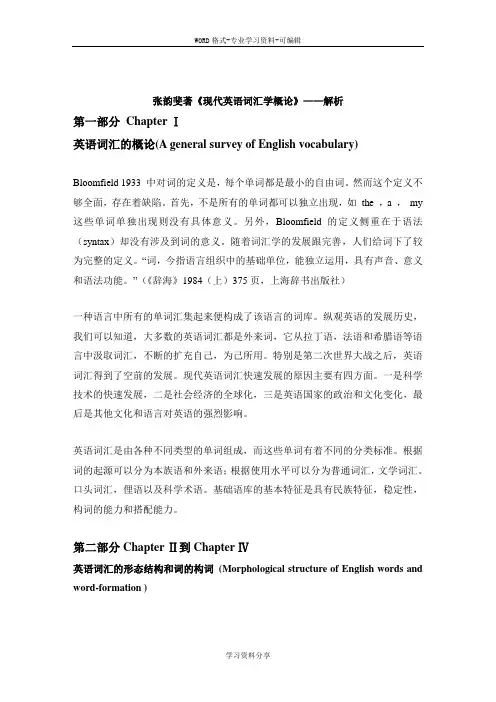
张韵斐著《现代英语词汇学概论》——解析第一部分Chapter Ⅰ英语词汇的概论(A general survey of English vocabulary)Bloomfield 1933 中对词的定义是,每个单词都是最小的自由词。
然而这个定义不够全面,存在着缺陷。
首先,不是所有的单词都可以独立出现,如the ,a ,my 这些单词单独出现则没有具体意义。
另外,Bloomfield的定义侧重在于语法(syntax)却没有涉及到词的意义。
随着词汇学的发展跟完善,人们给词下了较为完整的定义。
“词,今指语言组织中的基础单位,能独立运用,具有声音、意义和语法功能。
”(《辞海》1984(上)375页,上海辞书出版社)一种语言中所有的单词汇集起来便构成了该语言的词库。
纵观英语的发展历史,我们可以知道,大多数的英语词汇都是外来词,它从拉丁语,法语和希腊语等语言中汲取词汇,不断的扩充自己,为己所用。
特别是第二次世界大战之后,英语词汇得到了空前的发展。
现代英语词汇快速发展的原因主要有四方面。
一是科学技术的快速发展,二是社会经济的全球化,三是英语国家的政治和文化变化,最后是其他文化和语言对英语的强烈影响。
英语词汇是由各种不同类型的单词组成,而这些单词有着不同的分类标准。
根据词的起源可以分为本族语和外来语;根据使用水平可以分为普通词汇,文学词汇。
口头词汇,俚语以及科学术语。
基础语库的基本特征是具有民族特征,稳定性,构词的能力和搭配能力。
第二部分Chapter Ⅱ到Chapter Ⅳ英语词汇的形态结构和词的构词(Morphological structure of English words and word-formation )(一)词素(Morphemes)单词是有词素(morphemes)构成的。
词素即英语语言中有意义的最小单位,同时具有声音和意义。
单词可以有一个或一个以上的词素组成。
如:nation 是一个词素,national有nation+al 两个词素。
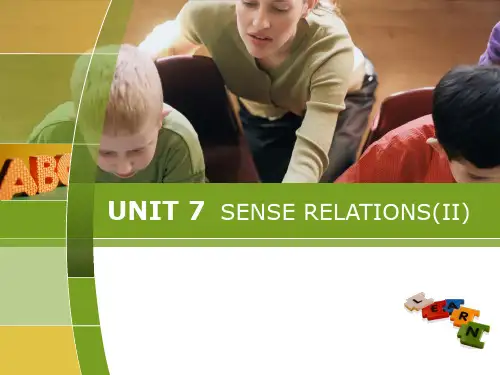
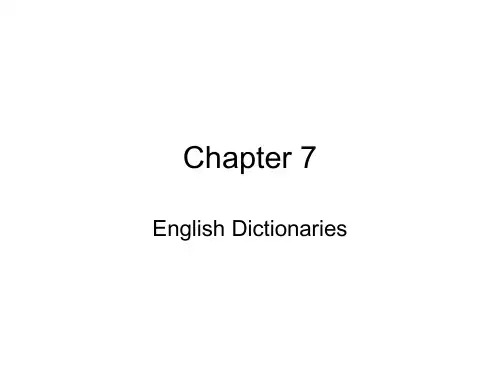
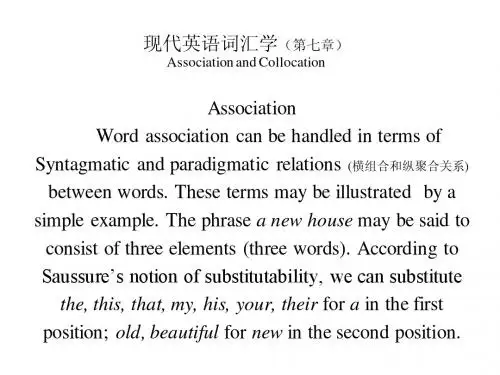
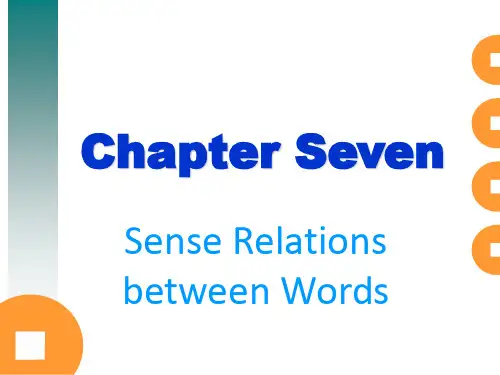
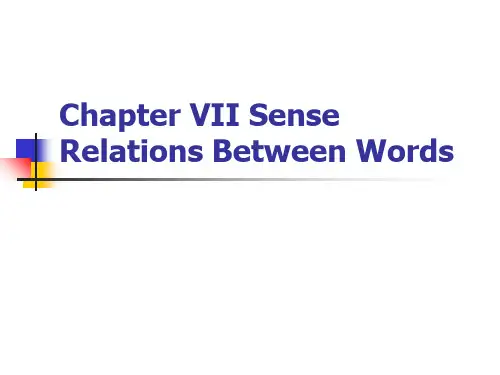
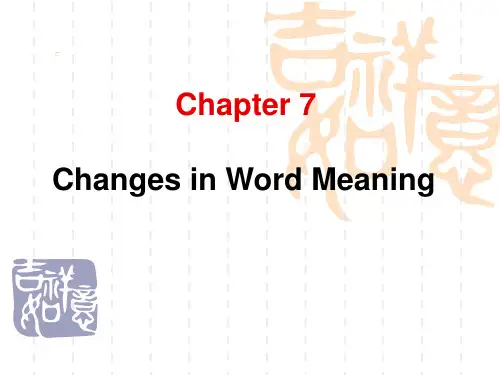
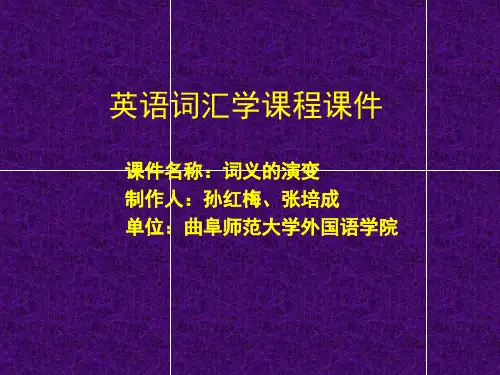
Chapter 7 Sense Relations Between Words■7」Synonymy同义关系■7.2 Antonymy反义关系■7.3 Hyponymy上下义关系■7.4 Semantic Field 语义场7.1 SynonymySynonyms: words differing in sound fonn but identical or similar in meaning.* Synonymy: a relationship of 'sameness of meaning5 that may hold between two words. Synonym: a wordthat means the same as anothe匚*Or exactly one of two or more words which have the same or very nearly the same essential meaning.•Kinds of synonymsThere are two kinds of synonyms1)Complete synonyms: are words which are identical in meaning in all its aspects.*They're rare.Two words are totally synonyms only if they are fully identical in meaning and interchangeable inany context without the slightest alteration in connotative ,affective and stylistic meanings . Eg.spirants fricative (phonetics ) caecitis -typhlitis (medicine ) vvord-formation - word-building (lexicology )2)Relative synonyms : also called quasi-synonyms.Differ from complete synonyms in the following respects:a)In degree of a given quality or in shade of meaning;Eg. small .tiny .diminutive .minute .microscopic .infinitesimal -一they denote different degrees ofsmallnessanger .rage 9fuiy .indignation .wrath -they denote the emotional excitement induced by intense displeasure .b)In affective meaning, and stylistic meaning;i.affective meaning(emotive meaning )Eg. little -smalllittle -emotion is associate with the designationsmall -has no affective meaningthrifty /frugal -niggardly /miserly black -niggerii.stylistic meaning: words which refers to the same thing but belong to different stylistic layers :neutral (common ),colloquial,literary ,slang ,vulgar ,scientific and technical ,ect・ Eg.chide (literary )berate(neutral ) scold(neutral) blame(neutral) carpet(colloquial ,esp. BrE) tell^(colloquial) bawl out (AmE.,slang )c)In collocation and distribution:Eg. pretty -girl /child /flower /garden /colour /village/cottagehandsome -boy /masterpiece /car /table /overcoat /airliner /housed)Some sets of synonyms belong to different dialects of the language•Synonymous patternsa)The double scale patternEg・b)The triple scale patternEg・• The choice and appropriate use of synonyms1)Difference in denotationSynonyms may differ in the range and intensity of meaning・ Some words have a wider range ofmeaning than others.comprehend / understandextend / increase / expandlau^h: chortle, chuckle, giggle, guffaw, snicker/sniper, titter2)Difference in connotation.By connotation, we mean the stylistic and emotive coloring of words. Some words share the samedenotation but differ in their stylistic (emotional) appropriateness.unlike / dissimilar homely / domesticLook at that lovely little boy.Look at that small boy.Look at that tiny boy.3)Difference in application.Many words are synonymous in meaning but different in usage in simple4)Difference in applicationMany words are synonymous in meaning but different in usage in simple terms. They form differentcollocations and fit into different sentence patterns (distribution: pre- or post- modifier).empty (box, street, room), vacant (seat, chair, apartment), blank (check, a blank sheet of paper)accuse....of, charge...with, rebuke・.・for, reproach...with/for水synonyms also includes three other aspects:(1)synonyms of different word-class (jealous -jealousy)(2)words synonymous with phrases (to tolerate -to put up with )(3)different sentence patterns expressing roughly the same ideaeg. He was the sole provider of the family •He alone had to support the family .He was the only person to provide for the family .7-2 Antonymy反义关系Antonyms: words which are opposite in meaning.(opDOsiteness of meaning )• Types of antonymsA. antonyms classified on the basis of semantic contrasta) Contraries相对反义词Antonyms of this type are best viewed in terms of a scale running between two poles orextremes. The two opposites are gradable.-hot, warm, cool, cold-beautiful, pretty, good-looking, plain, ugly- old-young, open-close, big-small, poor-richb) Complementaries绝对反义词/互补反义词These antonyms truly represent oppositeness. They are so opposed to each other that theyare mutually exclusive and admit no possibility between them (non-gradable).The assertion of one is the denial of the other.-dead-alive,approval-disapprovalpresent-absent, male-female, true-false,capable-incapable一Prefixes: dis-, in-, il-, ir-, im-, un-c)Coversives换位反义词/关系反义词This third type consists of relational opposites, one member of the antonyms pairpresupposes the other member.一Husband-wife, fiance-fiancee, employer-employee, debtor-creditor- Above-below, in front of-behind, up-down一Buy-sell, give-receive, go-come, gain-loseB. antonyms classified on the basis of the morphological structurea) Marked and unmarked members (有标记项和无标记项)E.g.: tiger(unmarked), tigress(marked)•The unmarked member is used much more widely than merely as a contrast with the marked one,which is more specific in denotation.•Old/young; “How old/young are you?"•big/small; "How big …?"•wide/naiTow; “How wide ...?M•Heavy/light*The cover teim is called "unmarked,\ i.e. usual; and the covered "marked", or unusual.b) Some words without antonyms*Not all words have antonyms:Eg. House, window, forest, hook, coal...d)Different antonyms under different circumstancee)Lexical antonyms vs syntactic negationLexical antonyms is often stronger than syntactic negation.(using not)Eg. impossible -not possibleunfair -not fair disloyal-not loyal to disobey -not to obeyf)Word order of antonymous pairs Eg.Eg. an old man -a young man athin slice -a thick slice a tallbuilding -a low buildingan old house -a modern /new housea thin man -a fat mana tall man -a short manheaven and earth 天地man and wife 夫妻cause and effect 因果come and go 来去far and near /wide 远近black and white 黑白thick and thin 厚薄fire and water 水火heat and cold 寒暑eat and drink 饮食right and left 左右rich and poor 聘夫old and new 新旧heavy and light 轻重sooner or later 迟早• Use of antonymsAntonyms are often used for the sake of contrast to impress one ' s listeners or readers. Eg. in proverbial sayingsSweet as honey .bitter as gall .Art is long Jife is shortMore haste .less speed •Light come ,light go .7.3 Hyponymy 上下义关系Hyponymy: is the relationship which obtains between specific and general lexical items Eg. cat is a hyponymy of animal flute of instrument .chair of furnitureThis sense relation may be shown by thefollowing diagram :foodFood is a superordinate (•上 义i 司),meat, vegetable and fruit arehyponyms (卜 义词)or subordinates of food, and they are co-hyponyms (共下 义词).But their status either as superordinate or subordinate is relative to other terms.7.4 Semantic Field 语义场Semantic Field Theory 语义场理论…•德国Jost Trier 20世纪30年代> The set of terms which are hyponyms of the same superordinate terms are called co-hyponyms, which are also knows as semantic fields.> The words of language can be classified into sets which are related to conceptual fields and divide up the semantic space or the semantic domain in certain ways. For example, apple, pear, date and etc. make up the semantic field of u fruits ,\ > The German linguist Jost Trier saw vocabulary as 'an integrated system of lexemes interrelated in sensei Therefore, the 'words of language can be classified into semantically related sets of fields.Eg. -Semantic field of colours: red, orange...-Semantic field of kinship: son,fat her...-The semantic field of kinship: father, mother, son, daughter, brother, sister... ■联系性 I like lemon. orange, apple, grapered, black, green■层次性 鸟、鱼、昆虫、哺乳动物Imeat vegetable Beef pork mutton celery spinach cabbage apple orange禽兽猪、牛、马…• Characteristics1)Words in the same field are joined by a common semantic feature, such asthe concept of color or of the kinship.2)Word frequency in the same field varies,e.g. in the field of color:The words with the highest frequency: white, black, green, blue, red, yellowThe ones with the second highest frequency: pink, orange, scarlet, crimson, violet The ones with the least frequency: lemon, emerald, sandy, coral3)Words of the same field are semantically interdependent: the meaning ofone word in a semantic field is limited by the meaning of its neighbors, or is determined by the position the word occupies in the field. Only theneighbouring words can identify the semantic fieldLemon: orange, apple, bananaLemon: red, orange, blueI like lemon.4)Words in the same semantic field are likely to have a number ofcollocations in common.(raw / taste /fiy)pork, beef, mutton。
Word :a minimum free form of a language. With a unity of s ound and meaning(both lexical meaning and grammatical meaning),performing syntactic meaningCriteria of words: by origin(native—old English )( and loan language—borrowed English),by level of usage(common words, literary ,colloquial, slang and technical words);by notions(function and content words)Morpheme: smallest meaningful linguistic unit of language, not divisible or analyzable into smaller form. A morpheme is also two-facet language unit which possesses sound and meaning.Classification of morphemes: free morpheme-utter alone with meaning(a free morpheme is a word in traditional sense); bound morpheme—must appear with one other morpheme, free or bound)Root: the basic unchangeable part of the word, convey the main lexical meaning of the word. Either free or bound.(free roots and bound roots)Affixes: ----inflectional affixes(have only particular grammatical meaning)and derivational affixes.(added morpheme to create new words.)---prefixes and suffixesWord-formationThree major processes : compounding(joining tow or more bases to form a new unit of compound words)Derivation(forming a new word by addition of a word element)Conversion(a word of certain word-class is shifted into another word-class without any affixes)Eight minor processes :Acronymy (Initialisms –using the first letter from proper name ,phrase, technical words)Ainitialism is pronounced letter by letter) and acronyms—from the initial letters of the name of an organization or scientific term)==are pronounced as words.Clipping(deletion of one or more syllables from a word—usually a noun, which is also available in its full form)Classification—back clipping, front clipping ,front and back clipping and phrase clipping.)Blending---formed by combining the meanings and sound of tow words.one of which is not full form or both of which are not full form. )不完整拼缀Back-formation(coined by the deletion of a supposed affix from a longer form already present in the language.)Words from proper names(including names of scientists, names of politicians and statesman, names of places, trademark, literature)Reduplication(a compound word is created by the repetition(1)of one word like go-go(2)almost identical words with a change in the vowel’s such as ping-pong.(3)of two almost identical words with a change in the initial consonants ,as in teenyweeny.Neoclassical(new words are formed from elements derived from Latin and Greek)The majority of neoclassical formations are scientific and technical.MiscellaneousWord meaning and sense relations1,conventionality—no way to explain why this or that sound-symbol and its sense.2,motivation—phonetic ,morphological, sematic3,main types of word meaning(interrelated andinterdependent)---class and inflectionalparadigm)andmeaning; connotative meaning—emotional association; social or stylistic meaning and affective meaning)Binary opposites.二相对立Polysemy—a term used in sematic analysis to refer to lexical item which has a range of meanings.)T wo approaches—diachronic and synchronic.---primary meaning and derived meaning, central meaning and secondary meaning(in some cases, the primary meaning and the central meaning coincide.)Two processes leading to polysemy---radiation(each of the secondary meanings may become a center of further radiation),concatenation(linking together, like the links of a chain.Homonymy(---pronounced alike, spell alike, or both.)---types of homonyms(perfect homonyms—word identical in sound and spelling but different in meaning)(Homophones---identical in sound but different in spelling and meaning.)(Homographs—identical in spelling but different in sound and meaning.)Polysemic and homonymous words are stylistically useful to achieve humour or irony, or to heighten dramatic effect. Synonymy(—identical in meaning but different in sound and spelling.)--- Complete synonyms(absolute),Relative synonyms.Antonymy (--opppsiteness of meaning)---contrary, complementary and conversives ….Antonyms classified on the basis of morphological structure: root antonyms and derivational antonyms.Marked and unmarked words---subsume.(Marked members can not be used to include unmarked member.) Hyponymy—(relationship which obtains specific and general lexical items)Superordinate term(an upper term),Subordinate terms(a lower term)===hierarchical system Sematic field---is not simply a listing of independent items, organized into areas or field.Charateristic of the same sematic field.1),word frequency in the same semantic varies 2)these words are semantically interdepent.3) words in the same semantic field are likely to have a number of collocation on common. Changes in word meaning---1,causes:historical,social,foreign influence, linguistic and psychological .2, Four tendencies in sematic change---restriction, extension, degeneration, elevation (of meaning)具体化,普遍化,语义转贬,语义改良。
张韵斐著《现代英语词汇学概论》——解析第一部分Chapter Ⅰ英语词汇得概论(Ageneralsurvey ofEnglish vocabu lary)Bloomfield1933中对词得定义就是,每个单词都就是最小得自由词.然而这个定义不够全面,存在着缺陷。
首先,不就是所有得单词都可以独立出现,如the ,a ,my 这些单词单独出现则没有具体意义.另外,Bloomfield得定义侧重在于语法(syntax)却没有涉及到词得意义。
随着词汇学得发展跟完善,人们给词下了较为完整得定义.“词,今指语言组织中得基础单位,能独立运用,具有声音、意义与语法功能。
”(《辞海》1984(上)375页,上海辞书出版社)一种语言中所有得单词汇集起来便构成了该语言得词库。
纵观英语得发展历史,我们可以知道,大多数得英语词汇都就是外来词,它从拉丁语,法语与希腊语等语言中汲取词汇,不断得扩充自己,为己所用.特别就是第二次世界大战之后,英语词汇得到了空前得发展。
现代英语词汇快速发展得原因主要有四方面。
一就是科学技术得快速发展,二就是社会经济得全球化,三就是英语国家得政治与文化变化,最后就是其她文化与语言对英语得强烈影响。
英语词汇就是由各种不同类型得单词组成,而这些单词有着不同得分类标准。
根据词得起源可以分为本族语与外来语;根据使用水平可以分为普通词汇,文学词汇。
口头词汇,俚语以及科学术语.基础语库得基本特征就是具有民族特征,稳定性,构词得能力与搭配能力。
第二部分Chapter Ⅱ到Chapter Ⅳ英语词汇得形态结构与词得构词(Morphologicalstructure of Engli shwords and word—formation)(一)词素(Morphemes)单词就是有词素(morphemes)构成得。
词素即英语语言中有意义得最小单位,同时具有声音与意义.单词可以有一个或一个以上得词素组成。
如:nation就是一个词素,national有nation+al 两个词素。